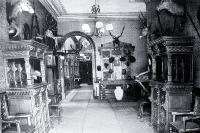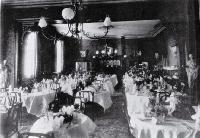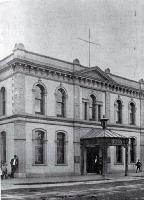![]()
Lizzie Westwood was born in Hertfordshire in 1826, the daughter of Jane Franklin and her husband William Westwood, a farmer. The family was struggling to maintain its middle-class status. A brother was able to enter the Horse Guards. Lizzie was proficient both as singer and pianist, but these talents could do no more than lead her into the genteel but poorly-paid position of governess.
At 33 Lizzie planned to emigrate to New Zealand on board the Burmah. However, alterations were made in the arrangements of the vessel to make room for 'beautiful breeding stock, horses and cattle, said to be larger than any previous importation', and the amount of space for passengers was curtailed. Moreover, Lizzie, discovered that her cousin, James Gapes, his wife, children, and sisters were coming to Canterbury on the Regina, so she decided to join them. Another Burmah passenger, Samuel Butler, later a famous writer, transhipped to the Roman Emperor. Luck was with Lizzie and Samuel. The Regina arrived in December 1859, the Roman Emperor in January 1860. The Burmah sank with all on board.
In Christchurch James Gapes prospered as proprietor of a painting and paperhanging business, entered local body politics, being twice Mayor of Christchurch, and was active in musical circles. In Victorian terms, Lizzie was likewise successful. By March 1860 she was married to a widower, George Allen, once a steerage passenger on the Charlotte Jane but now a prosperous market gardener on Manchester Street. His name survived in the by-ways George (now Southwark) Street, and Allen Street.
Lizzie gained considerable status in musical circles. In 1865 there was a performance in aid of the benevolent fund of the Licensed Victuallers' Association. The advertisement noted that there would be a medley 'in which Mrs G Allen has kindly consented to appear'. A review noted: 'There was the duet 'What are the wild waves saying?' nicely sung by Mrs Allen and Miss Thompkins'.
Lizzie made an excellent spouse for George Allen, a man with political aspirations. However, George never made it onto the city or provincial councils. Rather, he was a leader of protest groups like the Middle Island Association which advocated the political separation of the North and South Islands on the grounds that too much of the taxpayers' money was going into the subjugation of northern Maori rebels. In 1865 he headed the Ratepayers' Mutual Protection Association, the 'Dirt and Darkness Club', which questioned the city council's rights to exist. Property owners refused to pay their dues and the infant city was without light and sanitation till the defection of the association's legal brain, W H Wynn-Williams, brought it to its knees.
George died in January 1871. Lizzie, with valuable land in Manchester Street as her inheritance, cast about for a second husband, and, in December 1872, married a musical acquaintance, John Etherden Coker.
Coker, six years his wife's junior, was a flashy man, carried a riding crop and wore close-fitting cords, top boots and top-hat. A notorious would-be hotel entrepreneur and perennial bankrupt, he could now, with his handsome wife and her even more handsome fortune, put his past behind him. The couple moved to Wellington where 'Johnny Coker, the most experienced of bonifaces and most genial of hosts', became licensee of the Occidental Hotel. In 1878 the pair returned to Christchurch. On one of his wife's sections John built Coker's Hotel which soon became famous for the quality of its service. The newspapers enthused: 'Wherever the white man has established civilization, one has heard of Coker's Hotel. All the celebrities have sojourned within its hospitable portals'. One guest was Rudyard Kipling. His story 'Mrs Bathurst' centres round an attractive hotel employee though the author has used literary licence and transported her locale to Auckland.
Eventually the Cokers set up house at New Brighton. John, inevitably, became licensee of the local hotel, but any ideas of a 'Coker's by the sea' ended with his death in 1894.
In 1895-96, still owner but no longer licensee of Coker's Hotel, Lizzie faced a gruelling challenge. In Manchester Street there were business people, householders of the 'respectable labouring class', and prostitutes. Prohibitionists, while conceding that there was 'nothing tinsel about Coker's', nevertheless tried to shut down the watering hole by claiming that its George Street Bar was the haunt of 'prostitutes and their consorts'. Litigation, bitter and sometimes bizarre, ensued. One man claimed tha, from his window he had seen 'men and women coming tumbling out of the bar'. An expert witness was called to show that to view such an event from his window 'he would have to put his head out seven feet six inches'.
In 1896, at Wellington, Lizzie married a third time. She was now 70 but, on her marriage certificate claimed to be 51. Her husband, Frank James Hurd, entered into the conspiracy, upping his age from 40 to 47. The couple visited England and Canada, the latter being the country where Lizzie's brother - he of the Horse Guards - had settled. Lizzie maintained contact with cousin James Gapes; one of his granddaughters was a witness at her latest wedding. Other grandchildren found her a fantastic creature in elaborate wigs and huge fur coats. But she was a genial and generous soul and to those of her relatives who had fallen on hard times she gave discarded clothing to be used as blankets.
Lizzie died in 1910 and was buried with John Coker at Linwood Cemetery. The bulk of her estate went to her husband and Coker's spinster daughter. Her 'wearing apparel' she left to the daughters of 'my cousin James Gapes heretofore Mayor of the City of Christchurch'. The income from an investment of one thousand pounds was to go, during his lifetime, to Hurd, and thereafter to James' descendants. When Hurd died in 1942, the Gapes family constituted an army, and the women of the clan were able to buy new hats and little else.
Sources
- Births, deaths and marriages, Christchurch
- Burke manuscript, Christchurch City Libraries
- Butler, Samuel, First year in Canterbury Settlement, 1863
- Canterbury Pilgrims' and Early Settlers' Association scrapbook, Christchurch City Libraries
- Church register transcripts, Christchurch City Libraries
- Early Christchurch hotels, Christchurch City Libraries
- Greenaway, Richard, 'My favourite relative', Press, 31 December 1976
- Lamb, R C, Early Christchurch, 1963
- Linwood Cemetery burial book, microfilm, Christchurch City Libraries
- Lyttelton times, 7 December 1859, 31 July & 1 August 1865, & 5 August 1910
- Macdonald, G R, 'John Etherden Coker: the many ups and downs of a hotelkeeper', Press, 9 June 1956
- Macdonald biographical dictionary, Canterbury Museum
- Macleod, Nellie, The fighting man, 1964
- Marriage certificate of Frank James Hurd and Lizzie Coker. Copy obtained by Len Dangerfield from Births, deaths and marriages, Lower Hutt
- New Zealand mail, 11 December 1875 & 31 August 1894, Alexander Turnbull Library, Wellington
- Owles scrapbook, Christchurch City Libraries
- Press, 31 July 1865 & 5 August 1910
- Shipping index to New Zealand, 1839 to 1889: Comber index: microfiche, 1985
- 'Wowsers take on Coker's - and lose', Press, 26 June 1993
Family information supplied by Daisy Greenaway, Christchurch, and Shirley Keith, Auckland.
Lizzie's song 'What are the wild waves saying?' is based on a melancholy episode in Charles Dickens' novel Dombey and son.
Other resources - Christchurch City Libraries
- Catalogue search on Lizzie Coker
- Notable graves - Linwood Cemetery Area 16 Row D no. 6133


 Discover your family’s history at our libraries
Discover your family’s history at our libraries


